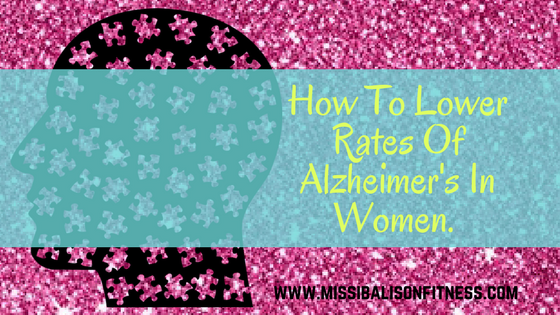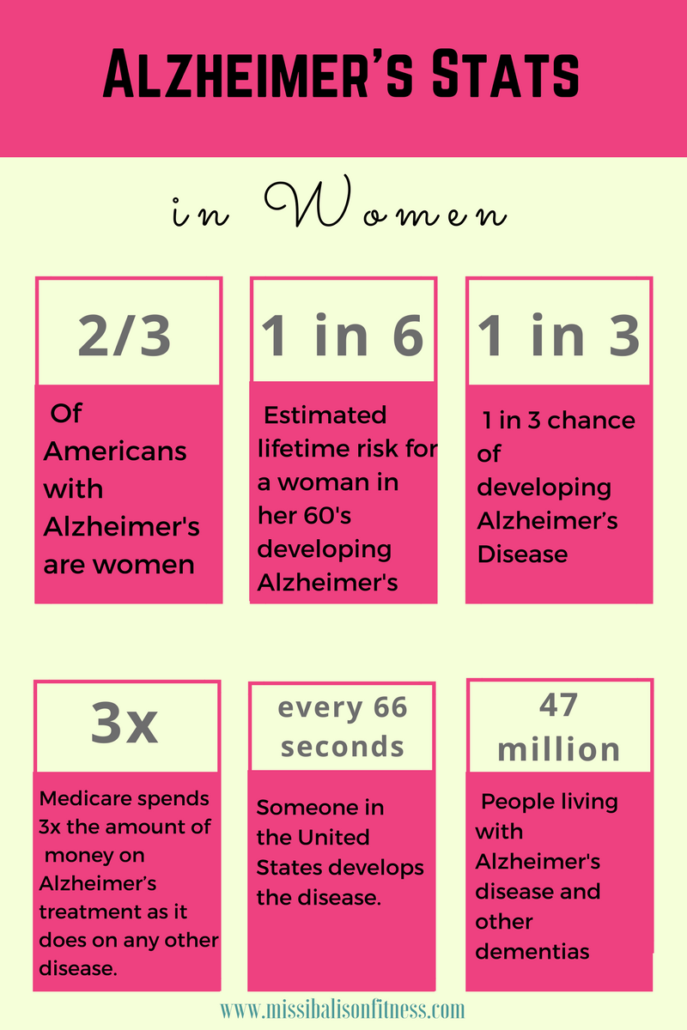Tips To Lower Alzheimer’s In Women
June 21st is World Alzheimer’s Awareness Day. Dementia and Alzheimer’s are serious subjects and I want to take the time to get real with you! It is so important to take care of your brain health now in order to live a long, healthy life
Did you know that as a women you have a 1 in 3 chance of developing Alzheimer’s Disease or another form of dementia?
Almost two-thirds of Americans with Alzheimer’s are women
In her 60s, a woman’s estimated lifetime risk for developing Alzheimer’s is 1 in 6. For breast cancer it is 1 in 11.
A woman’s estimated lifetime risk of developing Alzheimer’s at age 65 is 1 in 6,
You can learn more stats here: http://mybrain.alz.org/alzheimers-facts.asp
There is no cure, and the progression of the disease leads to eventual death. The first symptoms of the disease usually show up as forgetfulness, but as it worsens, more long-term memory loss occurs, along with other symptoms such as mood swings, irritability and inability to recognize languages.
Can You Improve Your Chances Of Getting Alzheimer’s?
The good news is there a way to boost brain function now and prevent dementia later in life.
I want to introduce you to an incredibly critical substance for our brain health, BDNF, or brain-derived neurotrophic factor, is a protein produced inside nerve cells. It functions like fertilizer for our brains. It helps the messages in get to where they need to go to keep us functioning optimally.
BDNF helps the brain to develop new connections, repair failing brain cells, and protect healthy brain cells. It has been shown that the protein is effective at reducing anxiety which is a condition so many menopausal women report experiencing. When it comes to Alzheimer’s disease BDNF has also been shown to protect the brain against the plaques associated with it.
It is clear that BDNF is something we will definitely want more of as we make the journey through the perimenopausal years.
How to raise BDNF with Exercise
 There are some pretty powerful exercise-induced benefits to the brain. On in particular is increased levels of a crucial protein called brain-derived neurotrophic factor (BDNF). BDNF is essential for maintaining healthy neurons and creating new ones. BDNF levels are directly correlated with growth of new neurons in the brain’s main memory-processing center.
There are some pretty powerful exercise-induced benefits to the brain. On in particular is increased levels of a crucial protein called brain-derived neurotrophic factor (BDNF). BDNF is essential for maintaining healthy neurons and creating new ones. BDNF levels are directly correlated with growth of new neurons in the brain’s main memory-processing center.
Exercise doesn’t have to be intense to be beneficial. Studies actually show that daily exercise is more effective than less frequent bouts of activity, another example of where the “consistency is key” mantra prevails
How to exercise to improve brain health:
- Adding a few bouts of sprints to your cardio session has been show to raise BDNF levels. While you’re out for a walk or run simply add a few 60 second speed bursts throughout your workout. It doesn’t take too much to show an increase in this powerful protein and you’ll increase your fat burning metabolism in the process.
- Incorporating complex movements into your workout routines such as bear crawls, agility drills and exercises requiring some coordination such as a lunge and curl will help boost your BDNF
- Taking your workout outside is an enjoyable way to increase BDNF. Not only will you get more Vitamin D which is shown to improve levels of BDNF but the stress relieving benefits of getting outdoors is very beneficial in alleviating the effects of depression that are linked to lower levels of BDNF
Your Brain On Nutrition
I truly believe that the way we eat will make a significant impact not only on the way we look, but our  outlook on life (LINK TO NEUROTRANSMITTER), the way we feel but on the health of our brain. When there are foods around that can cause us to feel better and DO better…Why not?!
outlook on life (LINK TO NEUROTRANSMITTER), the way we feel but on the health of our brain. When there are foods around that can cause us to feel better and DO better…Why not?!
The right diet may delay the onset of Alzheimer’s or lower your risk by as much as 40%. So, isn’t a diet change worth it?
Omega 3’s – Eating fatty fish such as salmon, herring, or white tuna once a week may slow cognitive decline by 10%.
Other foods that are high in omega 3s include:
- Walnuts (which actually look like a tiny brain, so that’s kinda cool)
- flaxseed,
- olive oil
Foods rich in Vitamin C & E – Are high in flavonoids. These vitamins play a big role in cleaning up the free radicals in your system. The more flavonoids a person eats, the lower the likelihood of developing dementia. It has also been shown that people that ate higher amounts of Vitamin E were found to have a risk of Alzheimer’s that was 67 percent lower than that of people who ate the least. That’s huge in my book. The more flavonoids a person eats, the lower the likelihood of developing dementia.
Here are some foods to choose to help you get more Vitamin C & E and flavonoids in your diet:
Vitamin C Rich Foods
- red peppers,
- currants,
- Broccoli,
- Strawberries
Vitamin E Rich Foods
- olive oil
- Almonds
Foods Rich In Flavonoids
- Apples
- blueberries,
- Cranberries
- grapefruit.
- asparagus,
- Brussels sprouts,
- cabbage,
- Garlic,
- kale,
- kohlrabi,
- Kidney
- lima beans,
- onions,
- Peas,
- Spinach
Spice Things Up To Boost Brain health
Eat curry in a hurry…It has been shown that people that eat foods that are prepared with the curry spice have better brain performance
Also, Turmereic or curcumin is said to help reduce the occurrence of the plaques ( amyloid plaque) that build up in the brain leading to Alzheimer’s
 Eat Folate Rich Foods
Eat Folate Rich Foods
Dark leafy greens and dried beans contain folate (a B vitamin) which is another compound that has been shown to help with brain health.
Now, as a trainer for the past years I have found that my clients love to learn this information but they have a harder time implementing it. I try to make the implementation part as easy as possible so I have put together a sample meal plan for you to help you get more of these amazing nutrients into your day.
Get The Good Mood Food Guide HERE:
[clickfunnels_embed height=”650″ url=”https://missibalisonfitness.clickfunnels.com/squeeze-page14375829″ scroll=”yes”]
June 21st is world Alzheimer’s Awareness Day Learn more about how you can donate or show your support at https://www.awarenessdays.com/awareness-days-calendar/world-alzheimers-day-2017/


